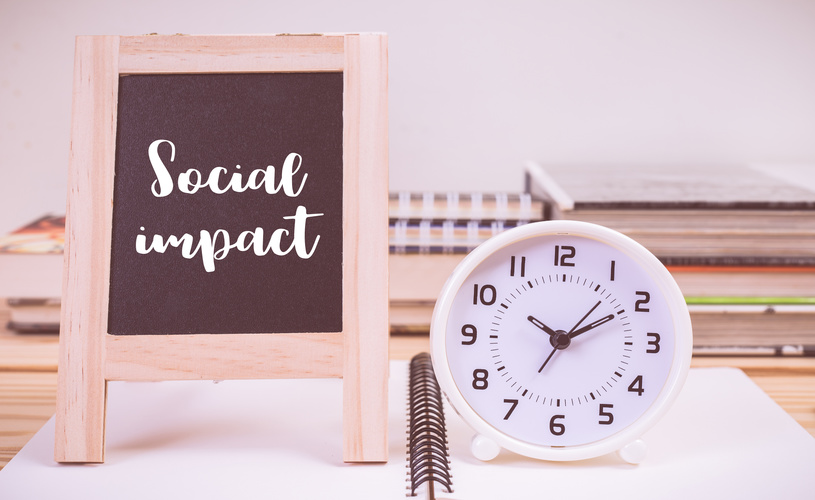Lessons from the Millennial Impact Report from Sorenson Impact students
When Calvin Pape interned at the Sorenson Impact Center in Salt Lake City in May 2018, his capitalist mindset was hard-earned. Between having to work part time jobs from when he was 14 and being raised by divorced parents busy with their own lives, “It wasn’t all flowers and unicorns growing up,” he says. It taught the 20-year-old David Eccles School of Business student that, “Monetary incentive is the only way to get people to do anything.”
But after just a month interning at the Sorenson Impact Center (SIC), an elegant house of white-walled offices formerly home to local military families, his view that self-interest was society’s only motivator softened.
At the center, which is dedicated to bringing about social change through innovative financing, policy work and data science, Pape worked on a housing-price database for SIC client Salt Lake City. At a time of overwhelming need in Utah for homes for low-income families, working on a social-issue project for a paying client restored his faith in the idea that you could benefit others for reasons that weren’t only about money.
On the wall of SIC’s communications’ office, Benjamin Franklin’s much-quoted maxim, “Do well while doing good,” is hand-written on a plastic board. “We’ve adapted that quote and given it more meaning,” says SIC communications intern Gabe Moreno, although he might also be speaking about his own generation. Talk to millennial SIC interns and it’s clear they have found in social impact–the fledgling movement of investing in businesses that catalyze social change first, generate profits second–a call to arms that perfectly mirrors their value system.
This is a generation comfortable with living their life on social media. At the same time, SIC interns credit smart phones and the internet as rendering millennials more empathetic than past generations. While baby boomers cared about financial stability and security, Moreno sees millennials as valuing, ”knowing our money is going into places that are actually making a tangible and measurable difference.”
Most of the seven millennial-interns interviewed for this story were aware of the idea of social impact long before they first heard the term. As a high school student at Bingham High School, Nikita Siddamsettiwar had helped raise funds for a low-income mother and her three small children living on food stamps and facing eviction. The now 20-year-old finance major and SIC intern realized that while just a few people can make change, the kind of impact she sought required a much larger business canvas. “I wanted to be part of a bigger organization where you can affect a larger demographic,” she says.
One way that can be achieved, says medical Ph.D. student and SIC intern Elena Ma is a “catalytic” business plan, where a company is “not just giving money to the poor but trying to use this money to start this machine to keep benefiting more people.” If the social impact element of the business is not integrated into the business model, then it’s typically not a good candidate for investment by the Sorenson Foundation, for whom the center provides diligence on companies seeking investments and guidance on those businesses’ potential social impact.
Social impact is not only about injecting much needed cash into businesses seeking to bring social change to under-resourced communities. It’s also developing sophisticated data programs for municipal, state and federal governments.
Intern Luke Tuttle manages a data-gathering project for SIC client Salt Lake County, quantifying the need for pre-school education on the west side of the Salt Lake valley, home to many of Utah’s minority populations. “What I’ve learned from it is that there are far more people who want to have access to pre-school but don’t, than have it and just don’t use it,” he says.
Working on SIC projects has left an indelible stamp on most of the interns’ future plans. Siddamsettiwar has amped up her volunteering since interning, including going on a humanitarian trip to Las Vegas to hand out safe sex kits, help with needle exchanges for addicts and talk to homeless youth. “I’ve realized life is very short,” she says. “I’m going to tailor helping another individual into every aspect of my life going forward.”
What surprised Ma was how emotionally rewarding social impact could be. She worked on a SIC education project involving a company that reaches three million rurally-isolated children in several African countries through SMS and text messaging to help them prepare for exams.
As a scientist, while “the central idea of working on curing disease has a specific humanitarian goal along with a profit motive,” it’s difficult to visualize the impact, she says. Impact investing can create the vision of a simple act, “such as helping a kid with studying,” she says. “It changes lives.”






